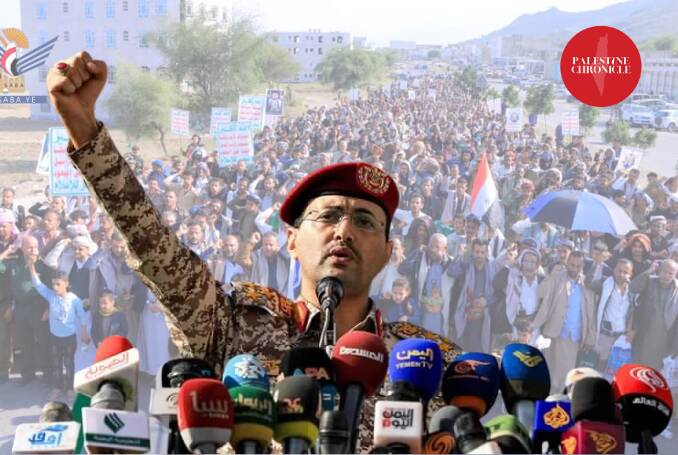
by Ramzy Baroud and Romana Rubeo
Ansarallah’s growing military and political role has reshaped Israel’s regional calculations, turning Yemen into an unexpected center of resistance.
Yemen remains Israel’s biggest challenge in the Middle East.
With the help of its friends in the region, Israel managed to at least sideline the powerful Lebanese resistance group Hezbollah from its direct fight for dominance. Indeed, Hezbollah would have remained an integral part of the equation if it were not for the fact that part of Lebanon’s ruling elites, often bankrolled and beholden to Arab and American diktats, exploited Hezbollah’s military engagement with Israel to achieve paltry political gains.
Another factor in the sidelining of Hezbollah is the fall of Syria to pro-US groups that, until recently, were designated as “terrorists” with the darkest affiliations with the region’s most notorious violent actors.
Even Iran, which remains a powerful regional force, has its own political calculations: On the one hand, it remains steadfast in the face of US-Israeli-Western, and even some Arab countries’, pressure, but on the other hand, it is also careful not to walk into a war that would serve no one’s interests aside from Israeli Prime Minister Benjamin Netanyahu and his American benefactors.
As a result, Iran remains committed to the same balancing act: blocking Netanyahu’s path toward total regional dominance, yet without being a direct factor in Netanyahu’s ongoing genocide in Gaza or the colonization of the West Bank.
Ansarallah, a group that until recently seemed a marginal Yemeni political actor, has now become arguably the most powerful geopolitical force in the region. Combined with the Palestinian Resistance in Gaza, Ansarallah continues to increase pressure on the Israeli government. Time will prove that Israel’s military calculations in Palestine and throughout the region were, in great part, affected by Ansarallah’s military escalation.
Yemen hits Ramon Airport
On Sunday, a Yemeni drone managed to strike Ramon Airport in the Naqab, one of the most fortified airports anywhere in the world.
Nearly two years into the Israeli genocide in Gaza and Ansarallah’s direct involvement in the war, Yemen remains a puzzle. Everything that has been done, including an outright declaration of war by the US and its allies on Dec. 18, 2023, did not prevent what was considered a small Yemeni militia from escalating its actions against Israel in solidarity with Gaza.
US, Israeli and Western media rarely give much space to speeches by Abdul-Malik al-Houthi, the leader of Ansarallah, as if the political discourse of the Yemeni group did not matter. In actuality, every statement delivered by al-Houthi, or by the Yemeni Armed Forces affiliated with Ansarallah, almost always precedes or follows a clear and decisive action. Every time Ansarallah declares that they have entered a new phase of the solidarity war against Israel, they deliver.
On Dec. 18, 2023, the US and a reluctant Western coalition declared the so-called Operation Prosperity Guardian, which later escalated into Operation Rough Rider under the Trump Administration on March 15, 2025.
Despite the dumping of massive quantities of explosives over Yemeni civilian infrastructure, the US, on May 6, eventually opted out.
The US, however, did not opt out of supporting Israel in the genocide in Gaza or its other regional military adventures elsewhere in the Middle East. There is a critical political lesson here. The unity of the Yemeni people, the refusal to succumb to pressure, and the daring of Yemeni action proved too taxing for the US.
Compare that with Syria, for example, where Israeli forces invade the country’s territory at will, faced only by bashful political statements and occasional diplomatic condemnations. In that case, the US has no reason to opt out or pressure Israel to stop its deadly raids.
Aside from Yemen, Iran too is an exception, where decisive and pinpointed Iranian responses to frequent Israeli aggressions have reminded the Americans that the price of continued war is too much to bear.
On Aug. 28, Israel escalated further by carrying out a massacre against the political leadership of Yemen, killing Prime Minister Ahmed Ghaleb al-Rahwi, along with other ministers. That was, too, a desperate attempt at scaring Ansarallah into surrender. The Yemeni response has been phased out in stages, targeting Israeli ships in the Red Sea, striking various Israeli targets using cluster ballistic missiles, and ultimately hitting Ramon Airport.
Israeli media constantly describe Yemen as a “black hole” for Israeli intelligence, with commentators asking why Mossad managed to penetrate various Middle Eastern societies, with the exception of Yemen.
The answer is simple: A tribal society motivated by ideals of honor, family and brotherhood is not easy to break or to purchase through money and promises of power. Additionally, Israel never paid much heed to Yemen because of the common mistake made by many others — that Yemen falls outside the traditional centers of power in the Middle East, which have largely been co-opted or weakened through internal conflicts.
This is why Yemen remains steadfast. But that steadfastness also means there is a need to rethink the historical approach to analyzing the Middle East, its powerful political players and, indeed, its very future.
Ansarallah’s solidarity actions with Gaza are troubling not only for Israel, but for ruling classes across the region as well, which are being sidelined as minor political actors, while yesterday’s marginal players are actively shaping the very idea of what the new Middle East will ultimately look like.
Ramzy Baroud is editor and Romana Rubeo is managing editor of the Palestine Chronicle, where this story first appeared.




